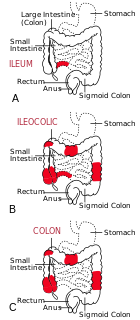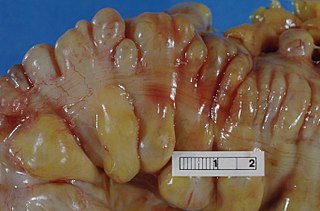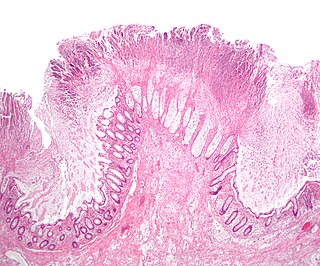Nonsteroidal anti-inflammatory drugs (NSAIDs) are members of a drug class that reduces pain, decreases fever, prevents blood clots, and in higher doses, decreases inflammation. Side effects depend on the specific drug but largely include an increased risk of gastrointestinal ulcers and bleeds, heart attack, and kidney disease.

Crohn's disease is a type of inflammatory bowel disease (IBD) that may affect any segment of the gastrointestinal tract from the mouth to the anus. Symptoms often include abdominal pain, diarrhea, fever, abdominal distension, and weight loss.

Ulcerative colitis (UC) is a long-term condition that results in inflammation and ulcers of the colon and rectum. The primary symptoms of active disease are abdominal pain and diarrhea mixed with blood. Weight loss, fever, and anemia may also occur. Often, symptoms come on slowly and can range from mild to severe. Symptoms typically occur intermittently with periods of no symptoms between flares. Complications may include abnormal dilation of the colon (megacolon), inflammation of the eye, joints, or liver, and colon cancer.

Defecation is the final act of digestion, by which organisms eliminate solid, semisolid, or liquid waste material from the digestive tract via the anus.

Irritable bowel syndrome (IBS) is a group of symptoms—including abdominal pain and changes in the pattern of bowel movements without any evidence of underlying damage. These symptoms occur over a long time, often years. It has been classified into four main types depending on whether diarrhea is common, constipation is common, both are common, or neither occurs very often. IBS negatively affects quality of life and may result in missed school or work. Disorders such as anxiety, major depression, and chronic fatigue syndrome are common among people with IBS.

Abdominal pain, also known as a stomach ache, is a symptom associated with both non-serious and serious medical issues.

Inflammatory bowel disease (IBD) is a group of inflammatory conditions of the colon and small intestine. Crohn's disease and ulcerative colitis are the principal types of inflammatory bowel disease. Crohn's disease affects the small intestine and large intestine, as well as the mouth, esophagus, stomach and the anus, whereas ulcerative colitis primarily affects the colon and the rectum.

Diverticulitis, specifically colonic diverticulitis, is a gastrointestinal disease characterized by inflammation of abnormal pouches—diverticula—which can develop in the wall of the large intestine. Symptoms typically include lower abdominal pain of sudden onset, but the onset may also occur over a few days. There may also be nausea; and diarrhea or constipation. Fever or blood in the stool suggests a complication. Repeated attacks may occur.

Mesalazine, also known as mesalamine or 5-aminosalicylic acid (5-ASA), is a medication used to treat inflammatory bowel disease, including ulcerative colitis and Crohn's disease. It is generally used for mildly to moderately severe disease. It is taken by mouth or rectally. The formulations which are taken by mouth appear to be similarly effective.

Colectomy is bowel resection of the large bowel (colon). It consists of the surgical removal of any extent of the colon, usually segmental resection. In extreme cases where the entire large intestine is removed, it is called total colectomy, and proctocolectomy denotes that the rectum is included.

Rifaximin, sold under the brand name Xifaxan among others, is an antibiotic medication used to treat travelers' diarrhea, irritable bowel syndrome, and hepatic encephalopathy. It has poor absorption when taken by mouth.

In the anatomy of humans and homologous primates, the descending colon is the part of the large intestine from the splenic flexure to the beginning of the sigmoid colon. The function of the descending colon in the digestive system is to store the remains of digested food that will be emptied into the rectum.

Olsalazine is an anti-inflammatory medication used in the treatment of inflammatory bowel disease such as ulcerative colitis. It is sold under the brand name Dipentum.

Biological therapy, the use of medications called biopharmaceuticals or biologics that are tailored to specifically target an immune or genetic mediator of disease, plays a major role in the treatment of inflammatory bowel disease. Even for diseases of unknown cause, molecules that are involved in the disease process have been identified, and can be targeted for biological therapy. Many of these molecules, which are mainly cytokines, are directly involved in the immune system. Biological therapy has found a niche in the management of cancer, autoimmune diseases, and diseases of unknown cause that result in symptoms due to immune related mechanisms.
Faecal calprotectin is a biochemical measurement of the protein calprotectin in the stool. Elevated faecal calprotectin indicates the migration of neutrophils to the intestinal mucosa, which occurs during intestinal inflammation, including inflammation caused by inflammatory bowel disease. Under a specific clinical scenario, the test may eliminate the need for invasive colonoscopy or radio-labelled white cell scanning.

Budesonide (BUD), sold under the brand name Pulmicort among others, is a medication of the corticosteroid type. It is available as an inhaler, pill, nasal spray, and rectal forms. The inhaled form is used in the long-term management of asthma and chronic obstructive pulmonary disease(COPD). The nasal spray is used for allergic rhinitis and nasal polyps. The pills in a delayed release form and rectal forms may be used for inflammatory bowel disease including Crohn's disease, ulcerative colitis, and microscopic colitis.
Secukinumab, sold under the brand name Cosentyx, is a human IgG1κ monoclonal antibody that binds to the protein interleukin (IL)-17A, and is marketed by Novartis for the treatment of psoriasis, ankylosing spondylitis, and psoriatic arthritis. It inhibits a member of the cytokine family, interleukin 17A.

Prinaberel is a synthetic, nonsteroidal, and highly selective agonist of the ERβ subtype of the estrogen receptor. It is used in scientific research to elucidate the role of the ERβ receptor. Studies have indicated that selective ERβ agonists like prinaberel could be useful in the clinical treatment of a variety of medical conditions including inflammatory bowel disease, rheumatoid arthritis, endometriosis, and sepsis. Accordingly, prinaberel either was or still is under investigation by Wyeth for the treatment of some of these conditions.
Abrilumab is a monoclonal antibody designed for the treatment of inflammatory bowel disease, ulcerative colitis, and Crohn's disease.
Biologics for immunosuppression are a class of immunosuppressive drugs which chemically are biopharmaceutical treatments.














